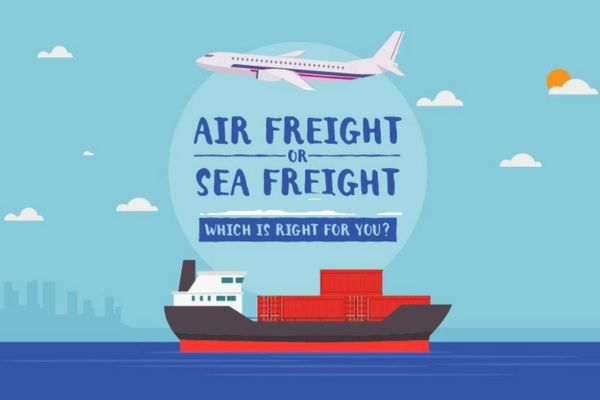When it comes to international shipping, choosing the most suitable transportation method is crucial for the success of your business or personal logistics needs. Air freight and ocean freight are the two primary options available for transporting goods across borders. Each method has its advantages and disadvantages, making the decision a critical factor in your supply chain management. In this blog post, we’ll compare air freight and ocean freight, highlighting their key differences, benefits, and considerations to help you determine which one is better suited for your specific requirements.
1. Speed of Delivery
Air Freight: One of the most significant advantages of air freight is its speed. Air cargo shipments are considerably faster compared to ocean freight. Depending on the distance and destination, goods transported by air can arrive at their location within days, making it an excellent choice for time-sensitive shipments.
Ocean Freight: On the other hand, ocean freight is a much slower mode of transportation. Ships have more extended transit times, and depending on the route and destination, it can take weeks or even months for goods to reach their final port. Ocean freight is ideal for bulk shipments that are not time-sensitive.
Conclusion: If speed is a critical factor, air freight is the better option. However, if your shipment can afford longer transit times and you’re looking for cost-effective solutions for bulk cargo, ocean freight may be the more suitable choice.
2. Cost Considerations
Air Freight: The swift nature of air freight comes with a higher price tag. Shipping goods by air is generally more expensive than ocean freight due to factors like fuel costs and limited cargo capacity on planes.
Ocean Freight: Ocean freight is known for its cost-effectiveness, especially for large and heavy shipments. The lower transportation costs per unit make it an economical choice for businesses with bulk cargo.
Conclusion: If your priority is cost-efficiency and you can accommodate longer transit times, ocean freight is the better option. For urgent shipments that demand a higher budget, air freight may be the preferred choice.
3. Environmental Impact
Air Freight: While air freight offers speed and efficiency, it has a more significant environmental impact compared to ocean freight. Airplanes consume significant amounts of fuel, contributing to higher carbon emissions.
Ocean Freight: Ships are generally considered a greener option for transporting goods as they have a lower carbon footprint per unit of cargo. Ocean freight produces fewer emissions per kilometer traveled.
Conclusion: If environmental considerations are essential to your shipping strategy, ocean freight is the more environmentally friendly option.
4. Reliability and Safety
Air Freight: Air freight is known for its reliability and safety. Airlines adhere to strict schedules, and the risk of damage or loss during transit is relatively low due to minimal handling.
Ocean Freight: While ocean freight is generally reliable, delays can occur due to weather conditions, port congestions, or unforeseen events. However, advances in technology and improved container security have made ocean shipping safer.
Conclusion: If you prioritize reliability and safety, air freight may be the better choice. However, if you can accommodate potential delays and prioritize cost-effectiveness, ocean freight remains a viable option.
5. Nature of Goods
Air Freight: Air freight is best suited for perishable and time-sensitive goods like fresh produce, pharmaceuticals, and electronics.
Ocean Freight: Ocean freight is more suitable for non-perishable goods, bulk shipments, and oversized cargo.
Conclusion: The type of goods you are shipping will play a significant role in determining the best transportation method for your needs.
Conclusion
In summary, the choice between air freight and ocean freight depends on several factors, including the urgency of delivery, budget constraints, environmental considerations, and the nature of the goods being shipped. If speed and time-sensitivity are crucial, air freight is the better option, albeit at a higher cost. For cost-effective transportation of bulk cargo with longer transit times, ocean freight is the preferred choice. Weigh the pros and cons carefully and consider consulting with a logistics expert to make an informed decision that aligns with your specific shipping requirements.


